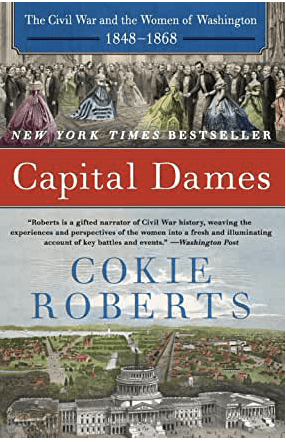Cokie Roberts has written about women from various periods of American history. Her most recent book, Capital Dames, tells the story of women in Washington, D.C. around the Civil War era. I had never considered how fearful the people of D.C. were during that time period, sure that they were to be attacked at any moment. Nor had I seen a sympathetic portrayal of First Lady Mary Lincoln. In history books she is presented as a confused, ineffective wife and mother, but Roberts shows her wielding power behind the scenes, one reason she was so disliked.
Prior to the war women were largely responsible for the social life of the city and they were honored for their efforts. They received preferential admittance to the galleries of Congress, discussed politics at their parties, and swayed their husbands.
According to Roberts, Dolley Madison was the first woman who “ruled Washington.” She had “a seat of her own in the House of Representatives, the privilege of sending the first personal telegraph, the presentation of a specially cast silver medal in memory of the War of 1812. Heads of state called on her to pay her homage. And her funeral shut down the city.”
During the years leading up to the Civil War, one of the women who ruled the city was Varina Davis. She held aspirations for the position of First Lady—and she was successful, but not in her beloved Washington. She was First Lady of the Confederate States of America. It was not a choice she might have mad,e as leaving D.C. was a difficult event for her.
During the war women’s roles shifted from managing social functions to public service. It was women who organized hospitals, cared for the wounded, and raised funds to provide services to veterans. As a result of women’s work during the war, nursing became a profession for women. This was the age of Clara Barton and Dorothea Dix. Barton organized hospitals and nursing in Washington D.C. and then provided medical care in field hospitals. Dix was Superintendent of Army Nurses. It was a time when Anna Elizabeth Dickinson, was invited to speak before the United States Congress. A gifted orator, she spoke on the need to abolish slavery and the chambers were packed. Later Clara Barton would testify before the Joint Committee on Reconstruction, perhaps the first woman to speak before a congressional committee. She lobbied (successfully) for funds to help locate missing soldiers and identify their remains.
Women did not hesitate to lobby for their positions, in their homes and at political conventions. They worked to have their husbands, fathers, and friends elected to office. After the war some, like Varina Davis, advocated for the release of their Southern husbands from prison; they knew their ways around the city from before the war when they had been some of the movers and shakers in Washington society.
Roberts makes the argument that the changing roles of women during the Civil War led to the suffrage movement’s resurgence after the war. It occurs to me that this is similar to World War II when women took on unconventional roles and, rather than go back to their domestic pursuits, began the women’s rights movement.

